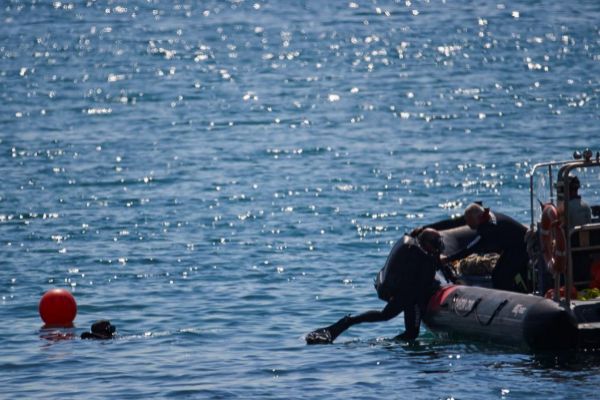The finding last week of a 1936 projectile on a Barceloneta beach had two immediate effects. The first, the reasonable expectation caused by tens of kilos of trilite -TNT- 20 meters from where hundreds of bathers are roasted every day in August. The second consequence was less reasonable: it began to spread that everything was a conspiracy. According to sectors of independence, someone - the State, the CNI, the Navy, the Civil Guard, someone after all - placed there, with dark objectives to be determined, an 80-year-old explosive. As seductive as the thesis sounds, the denial, ironic, the man who found the bomb: « No, I did not carry it on my shoulder. It was already there and it was a danger » .
Antonio Pérez Pino, first out of the Special Groups of Underwater Activities (GEAS) of the Civil Guard, located the device while swimming on the beach of Sant Sebastià. He gave the first alert and also certified its end. On Monday he accompanied the Navy until they detonated - a nautical mile and more than 40 meters deep - a projectile whose power sums up the effect it would have had if it had exploded where it found it: «It would have affected every body submerged one kilometer round ».
The presence of a civil guard out of service among bathers was also not a suspicious coincidence. "For more than 20 years, every day, I go swimming from that exact point." It is not an eccentric practice. Member of the Atlètic Barceloneta Swimming Club (CNAB) for decades, fulfills the same ritual as many other members of the entity. They bathe every day, summer or winter, right where the bomb was. «I will have passed over a thousand times and had never seen anything. Until that afternoon ».
Solidified on the seabed with decades of mud and stones on it, neither the earthworks nor the works carried out in that part of the coast before the Olympic Games allowed it to be detected before. Natural movements of the seabed and erosion over time have collaborated this time.
The finding, he admits, was related to chance, coupled with his experience. Member of the GEAS since 1991, while swimming, he saw a rock with a "strange shape" three meters deep. It was Saturday, at the time when only the most lagging tourists remain on the beach. "At first I thought it was a bottle," a vessel more thrown into the sea. "I did four or five dives to make sure." After removing part of the mud that was embedded, he reacted. "I saw one end and I knew it was a bomb."
The idea did not come from providence either. Expert by the Army in the search and detection of underwater explosive devices, Pino has participated in seven dives related to weapons without explosions of the Civil War. A fact that is not unusual in a country where thousands of bombs were forgotten after the contest. According to official data, since 1985 more than 300 artifacts have been found in Barcelona alone. More than 35,000 throughout the State. In the sea that bathes the Catalan capital "it is difficult to find one of a size and an explosive capacity similar to this," he says.
After warning of the finding, GEAS activated its protocols. Members of his unit inspected the device. They cleaned it completely and sent the images to the Navy's specialists in the Navy Naval Base. The order, in a matter of minutes, was clear: "You have to evict the entire area now." Before 12.00 on Sunday, the beach of Sant Sebastià was sealed.
Pino also participated in the detonation work of an explosive one meter high and 80 centimeters in diameter - known as Catalan by its place of manufacture -, with 70 kilos of trilite in an unknown state. The transfer was made with a flotation system, driven by a Navy boat. In it were Pino and three specialists. "If it exploded, it would affect the fewer people, the better." On Wednesday afternoon, four days after locating the bomb, Pino finally returned to his daily routine. «I go swimming again. This time I will not look to the bottom ».
According to the criteria of The Trust Project
Know more- Civil Guard
- Barcelona
- Catalonia
CataloniaDetoned the Civil War projectile with 70 kilos of trilite found on a beach in Barcelona
CataloniaMarlaska believes that security in Barcelona will improve shortly and criticizes the PP
CataloniaThe Iberia workers threaten a new strike in Barcelona

